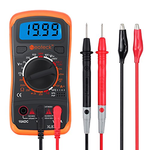What is "Creep and Blast Protection" Are you saying the cases may not be tight and over time could lead to an explosive event ....?
Essentially yes. But the event is not time related, it relates to incorrect usage. and in that context putting a multimeters in the hands of someone who has said they are not familiar with them raises the possibility of incorrect usage.
I agree the voltages around 12V batteries are not going to produce a hazardous shock risk, but the currents can be if a battery is shorted.
Don't forget that these types of meter can be hand held! If the unsubstantiated report of the Amazon meter not having a fuse on the current ranges is correct then that meter is in danger of actually melting if its current range is put across a 12V battery supply.
But even if a fuse is incorporated, many of these cheap meters don't use HRC fuses they use glass cartridge fuses, and sometimes when glass fuses are exposed to the unlimited current they will explode with quite a force, and some of cheap meters may not contain that explosive energy within the case. There are a lot of good videos on Youtube where meter designs are discussed and examples of where inadequate meters have failed.
The National Fire Protection Association (USA) has established a set of CAT ratings for electrical test equipment which has been widely adopted as the international standard for multimeters safety ratings. This is where a lot of the design effort goes into better quality multimeters not only enhancing safety but also measurement accuracy. All the major meter manufactures seem to apply these standards
However if the cheap meters are only used correctly on extra low voltage systems low, and mishaps are avoided then yes they will usually work satisfactorily but I wouldn't use them on mains supplies.


